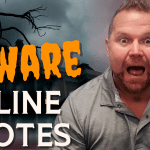Worst 5 MONEY TRAPS to Avoid During a Recession in 2022
What is a Money Trap?
Money traps are a slow drain on your financial health. Think “The Money Pit” with Tom Hanks and Shelley Long! Except, in most cases, the money trap isn’t as obvious as an old and dilapidated mansion. Truth is, most people likely don’t know how to respond to an economic crisis. With trends pointing towards a potential recession in 2022, I want to help people get AHEAD of the game so they’re not struggling to catch up later. Here are some really good starting points that you can do right now.
Recommended Reading: 5 Things to do During a Market Correction
Buying a Home
Your home is an investment. Right now, we’re starting to see the end of the housing bubble. Interest rates are going up, and it’s possible that they will continue going up into the extended future. Even if you feel financially ready to buy a home, I suggest taking a few things into consideration.
Family Size: Are you planning for your family to grow? If so, you’ll want to plan for that now. You could think of your first house as a “starter home”, OR you could start making payments on the house you want to settle into. One of the money pits to avoid is paying your closing costs a second time when you sell your home or a THIRD time when you purchase a new home.
Career: Let’s use that same logic and apply it to your career. If you don’t have a clear vision of where you plan to be in the upcoming years, what if you find your dream job and have to relocate? Whether it’s the next town over or 5 states over, you’ll probably still find yourself in a position where you have to get your home ready to sell. And with interest rates going up, it could be much harder to bank on a quick turnaround–especially if people start to behave more conservatively with their financial decisions.
Taking a 401K Loan
DO NOT TOUCH YOUR RETIREMENT SAVINGS DURING A RECESSION.
It may feel like a good idea since you can pay the loan back in a better economy, but the long-term damage can be more severe than a lot of people realize.
In my video, I talked about the importance of compound interest. Let’s break down what that means. Simple Interest will only calculate the principal balance. Compound Interest calculates the principal AND any interest that was previously earned. If you keep withdrawing from your savings account, you could be losing tens of thousands of dollars throughout the life of the account.

*This is a hypothetical example provided for illustrative purposes only; it does not represent a real-life scenario, and should not be construed as advice designed to meet the particular needs of an individual’s situation. Interest rates will vary and this illustration is not a guarantee of outcomes.
The next time you’re thinking about withdrawing or taking a loan from your 401k account, remember that you might be borrowing much more than you expect. If you don’t get the loan paid back before you leave your job, you will owe income tax on your loan amount. In addition, if you are under 59 1/2 you will owe an early withdrawal penalty of 10%. Seek a tax professional if you have more questions.
What to do with Credit Cards
With interest rates on the rise, this is probably not a great time to start using your credit cards. What most likely would be best is to build your credit for the future. Whether this is your first line of credit or you’re trying to raise your score for better loan offers down the road, here are suggestions to consider:
1. Open a low-limit credit card. Maybe around $1,000 – $2,000.
2. Put small charges on the card and keep your usage under 25%.
3. Never miss a due date, and pay off your balance as soon as possible.
4. Keep this line open as long as possible to increase your credit history.
If you follow these 4 simple steps, it should help you start building a better credit score. If you wait until the END of the potential recession to take out bigger loans, like a car or house, these smaller efforts can make a huge impact on the rates you can qualify for. Oftentimes, it’s better to sit tight and wait for interest rates to decline so you can keep your fixed expenses lower each month.
What are Your Fixed Expenses?
During a market decline, your fixed expenses are where your FOCUS should be. Fixed expenses are your essential bills and obligations. For example:
- Rent / Lease
- Car & Home Insurance
- Utility Bills
- Loan Repayments
- Credit Card Debts
- Subscriptions
Right now, I really do urge everyone to take a look at their fixed expenses and see where you can make some adjustments. Our team at The Resource Center would be happy to analyze your insurance rates! Because we’re an independent agency, we work with some of the biggest competitors and can shop your rates to see who can give you the best deal.
Money Traps in Retirement
If you’ve worked with me before, then you’ve probably already heard me say a thousand times that you can wonder if the next downturn will wreck your retirement, or you can make a plan designed to weather any storm. If you’re currently retired or thinking about retiring soon, here are some major components to consider in the upcoming market changes:
- Inflation Rates
- Your Budget
- Your Cash Reserve
- Debts
- Additional Income
If you’re thinking about retiring now, here’s my advice! Take these factors into consideration and decide what your monthly income will be. Pretend as though you’re done working and then live off the plan you created for no longer than 6 months. If you’re thriving and making it, great! If not, you need to reevaluate your cash reserve, focus on paying down debts, and you have to be willing to go out and make additional income in the event that inflation continues to rise.
If you’ve never worked with a financial planner, give me a call! I’m always happy to take a look at your plan and see if I can suggest improvements.
Contact Us
Phone: 417-882-1800
Email: info@resourcecenter.com
1304 E. Kingsley St, Springfield, MO 65804
8:30AM – 5:30PM
What to Do During a Market Correction
Catch Bruce Porter’s show Dollars & $ense Tuesdays at 3 pm on KOLR’s Ozarks Live
Visit our YouTube page for more videos
Investing involves risk, including the potential loss of principal. Any references to protection benefits of lifetime income generally refer to fixed insurance products, never securities or investment products. Insurance and annuity product guarantees are backed by the financial strength and claims-paying ability of the issuing insurance company. The Resource Center, Inc. is an independent financial services firm that utilizes a variety of investment and insurance products. Investment advisory services are offered only by duly registered individuals through AE Wealth Management, LLC, (AEWM). AEWM and The Resource Center are not affiliated companies. 1379451 – 6/22






